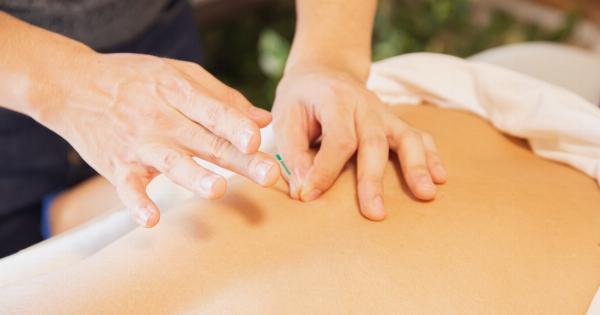Anxiety and depression are two of the most common mental health disorders, affecting millions of people worldwide. These conditions can significantly impact a person’s quality of life and overall well-being.
While there are various treatment options available, one alternative approach that has gained popularity in recent years is acupuncture.
What is Acupuncture?
Acupuncture is a traditional Chinese medicine (TCM) practice that involves the insertion of thin needles into specific points in the body.
These points are believed to be connected by pathways or meridians, which are channels through which the body’s vital energy, known as Qi, flows. By stimulating these points, acupuncture aims to restore balance and promote the body’s natural healing processes.
How Does Acupuncture Work for Anxiety and Depression?
Although the exact mechanisms behind acupuncture’s effects on anxiety and depression are not fully understood, several theories exist.
1. Regulation of Neurotransmitters
Research suggests that acupuncture may affect the levels of neurotransmitters in the brain, such as serotonin, dopamine, and norepinephrine. These neurotransmitters play a crucial role in regulating mood and emotions.
By modulating their levels, acupuncture may help alleviate anxiety and depression symptoms.
2. Activation of the Parasympathetic Nervous System
The parasympathetic nervous system is responsible for the body’s relaxation response. Acupuncture may stimulate this system, promoting a sense of calmness and reducing anxiety and stress levels.
3. Reduction of Inflammation
Studies have shown that acupuncture can have anti-inflammatory effects. Chronic inflammation has been linked to the development and progression of certain mental health disorders, including anxiety and depression.
By reducing inflammation, acupuncture may indirectly improve mood and reduce depressive symptoms.
4. Stress Reduction
Acupuncture has been shown to activate the hypothalamic-pituitary-adrenal (HPA) axis, which plays a key role in the body’s stress response. By modulating this axis, acupuncture may help reduce stress and improve overall mental well-being.
Benefits of Acupuncture for Anxiety and Depression
Acupuncture offers several potential benefits for individuals struggling with anxiety and depression:.
1. Natural Approach
Unlike medications, acupuncture is a natural and drug-free treatment option. This makes it particularly appealing for individuals who prefer a more holistic approach to managing their mental health.
2. Few Side Effects
Compared to certain medications used to treat anxiety and depression, acupuncture typically has minimal side effects. The most common side effects are mild and temporary, such as slight bruising or bleeding at the needle insertion sites.
3. Integrative Therapy
Acupuncture can be used as a complementary therapy alongside other conventional treatments for anxiety and depression. It does not interfere with medications or other therapeutic interventions.
4. Individualized Treatment
Each acupuncture session is tailored to the individual’s specific needs. Acupuncturists will consider factors such as the person’s overall health, specific symptoms, and underlying imbalances to create a personalized treatment plan.
Evidence Supporting Acupuncture for Anxiety and Depression
While more high-quality research is needed, several studies have suggested that acupuncture may be beneficial for managing anxiety and depression:.
1. Clinical Meta-Analysis
A meta-analysis published in the Journal of Clinical Psychiatry reviewed 30 clinical trials and found that acupuncture was superior to sham acupuncture and comparable to conventional medications in reducing depressive symptoms.
2. Randomized Controlled Trials
Several randomized controlled trials have shown that acupuncture can significantly reduce anxiety symptoms and improve overall mental well-being in individuals with generalized anxiety disorder.
3. Brain Imaging Studies
Functional magnetic resonance imaging (fMRI) studies have demonstrated that acupuncture can modulate brain activity in areas involved in emotional regulation and stress response, further supporting its potential therapeutic effects on anxiety and depression.
What to Expect During an Acupuncture Session?
If you decide to try acupuncture for anxiety and depression, here’s what you can expect during a typical session:.
1. Initial Consultation
Your acupuncturist will first conduct an in-depth assessment of your symptoms, overall health, and medical history. They will then develop an individualized treatment plan tailored to your specific needs.
2. Needle Insertion
During the session, you will lie comfortably on a treatment table. Your acupuncturist will gently insert thin needles into specific acupuncture points on your body. You may feel a mild sensation upon needle insertion, but it is generally not painful.
3. Needle Retention
After the needles are inserted, they will be left in place for approximately 20 to 30 minutes while you relax. Some acupuncturists may also provide additional techniques such as heat therapy or electroacupuncture during this time.
4. Treatment Duration
The number and frequency of acupuncture sessions will vary depending on your individual condition and treatment goals. Acute symptoms may require more frequent sessions initially, while chronic conditions may necessitate ongoing maintenance treatments.
Conclusion
While acupuncture shows promise as a potential treatment for anxiety and depression, it is essential to remember that it should not replace conventional medical care.
If you are experiencing severe symptoms or have been diagnosed with a mental health disorder, it is important to consult with a qualified healthcare professional for a comprehensive evaluation and appropriate treatment recommendations.































